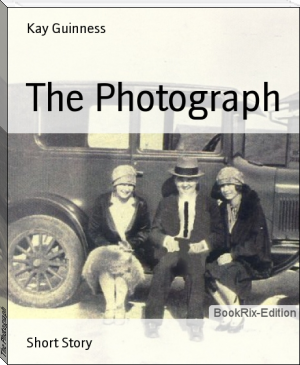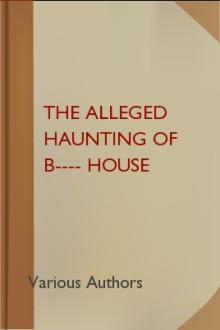Indian Ghost Stories - S. Mukerji (finding audrey .txt) 📗

- Author: S. Mukerji
- Performer: -
Book online «Indian Ghost Stories - S. Mukerji (finding audrey .txt) 📗». Author S. Mukerji
At about 2 P.M. I heard an extraordinary noise from the tree.
It was only the elephant. It was wailing and was looking as bad as it possibly could.
We all went there but found nothing. The elephant was not ill.
I ordered it to be taken away from under the tree. As soon as the chain was removed from the animal's foot it rushed away like a race horse and would not stop within 200 yards of the tree. I was vastly amused. I had never seen an elephant running before. But under the tree we found nothing. What made the elephant so afraid has remained a secret.
The servants told me (what I had heard before) that it was only elephants, horses and dogs that did not stay long under that tree. No human eyes have ever seen anything supernatural or fearful there.
THE STARVING MILLIONAIRE.This story was also in the papers. It created a sensation at the time, now it has been almost forgotten. The story shows that black art with all its mysteries is not a thing of the past.
This was what happened.
There was a certain rich European Contractor in the Central Provinces in India.
Let us call him Anderson. He used to supply stone ballast to the Railway Companies and had been doing this business for over a quarter of a century. He had accumulated wealth and was a multi-millionaire and one of the richest men in his part of the country. The district which he made his head quarters was a large one. It was a second class military station and there were two European regiments and one Indian regiment in that station. Necessarily there was a number of European military officers besides a number of civil and executive officers in that station.
On a certain June morning, which is a very hot month in India, an Indian Fakir came into the compound of Mr. Anderson begging for alms. Mr. Anderson and his wife were sitting in the verandah drinking their morning tea. It had been a very hot night and there being no electricity in this particular station, Mr. Anderson had to depend on the sleepy punkha coolie. The punkha coolie on this particular night was more sleepy than usual, and so Mr. Anderson had passed a very sleepless night indeed. He was in a very bad temper. A whole life passed among Indian workmen does not generally make a man good-tempered and a hot June in the Indian plains is not particularly conducive to sweet temper either. When this beggar came in Mr. Anderson was in a very bad mood. As the man walked fearlessly up to the verandah Mr. Anderson's temper became worse. He asked the beggar what he wanted. The beggar answered he wanted food. Of course, Mr. Anderson said he had nothing to give. The beggar replied that he would accept some money and buy the food. Mr. Anderson was not in the habit of being contradicted. He lost his temper—abused the beggar and ordered his servants to turn the man out. The servants obeyed. Before his departure the beggar turned to Mr. Anderson and told him that very soon he would know how painful it was to be hungry.
When the beggar was gone Mr. Anderson thought of his last remark and laughed. He was a well-known rich man and a good paymaster. An order for a £100 on a dirty slip of paper would be honoured by his banker without hesitation. Naturally he laughed. He forgot that men had committed suicide by drowning to avoid death from thirst. Well, there it was.
The bell announcing breakfast rang punctually at 10 o'clock in the morning. Mr. Anderson joined his wife in the drawing-room and they went to the dining-room together. The smell of eggs and bacon and coffee greeted them and Mr. Anderson forgot all about the Indian beggar when he took his seat. But he received a rude shock. There was a big live caterpillar in the fish. Mr. Anderson called the servant and ordered him to take away the fish and serve with eyes open the next time. The servant who had been in Mr. Anderson's service a long time stared open-mouthed. Only a minute before there was nothing but fish on the plate. Whence came this ugly creature? Well, the plate was removed and another put in its place for the next dish.
When the next dish came another surprise awaited everybody.
As the cover was removed it was found that the whole contents were covered with a thin layer of sweepings. The Khansama (the servant who serves at the table) looked at Mr. Anderson and Mr. Anderson at the Khansama "with a wild surmise"; the cover was replaced and the dish taken away. Nothing was said this time.
After about 5 minutes of waiting a third covered dish was brought.
When the cover was removed the contents were found mixed with stable sweepings. The smell was horrible, the dish was at once removed.
This was about the limit.
No man can eat after that. Mr. Anderson left the table and went to his office—without breakfast.
It was the habit of Mr. Anderson to have his lunch in his office. A Khansama used to take a tiffin basket to the office and there in his private room Mr. Anderson ate his lunch punctually at 2 P.M. Today he expected his tiffin early. He thought, that though he had left no instructions himself the Khansama would have the sense to remember that he had gone to office without breakfast. And so Mr. Anderson expected a lunch heavier than usual and earlier too.
But it was two o'clock and the servant had not arrived. Mr. Anderson was a man of particularly regular habits. He was very hungry. The thought of the beggar in the morning made him angry too. He shouted to his punkha coolie to pull harder.
It was a quarter after two and still the Khansama would not arrive. It was probably the first time in 20 years that the fellow was late. Mr. Anderson sent his chaprasi (peon) to look for the Khansama at about half past two. A couple of minutes after the chaprasi's departure, Mr. Atkins, the Collector of the district, was announced (A Collector is generally a District Magistrate also, and in the Central Provinces he is called the Deputy Commissioner). He is one of the principal officers in the district. In this particular district of which I am speaking there were two principal government officers. The Divisional Judge was the head of the Civil Administration as well as the person who tried the murderers and all other big offenders who deserved more than seven years imprisonment. He was a Bengal Brahman. Mr. Atkins was the Collector or rather the Deputy Commissioner. He was the executive head of the district. He was also the District Magistrate. Mr. Atkins came in and thus explained a sad accident which Mr. Anderson's Khansama had met with:
"As I was passing along the road in my motor car, your man came in the way and was knocked down. The man is hurt but not badly. He had been carrying a tiffin basket which was also knocked down, as a matter of course; and the car having passed over it everything the basket contained in the shape of china was smashed up. The man has been taken to the hospital by myself in an unconscious condition, but the doctor says there is nothing very serious, and he will be all right in a couple of days."
Now Mr. Atkins was a great friend of Mr. Anderson. They had known each other ever since Mr. Atkins's arrival in India as a young member of the Civil Service. That was over 20 years ago. He had at first been in that district for over 7 years as an Assistant Commissioner and this time he was there for over 3 years as a Deputy Commissioner. But Mr. Anderson was very hungry. The story of Mr. Atkins had given him the second shock since the morning. He, therefore, used language which no gentleman should have done; and with great vehemence threatened to prosecute Mr. Atkins for rash driving, etc.
Mr. Atkins was a very good-natured man. He knew the temper of Mr. Anderson; but he had never been Anderson so angry before. He therefore beat a hasty retreat, wondering whether Anderson had not gone mad. He would not have told anybody what happened in Anderson's offices if he had known the starving condition of the millionaire, but as it happened he repeated the fine language that Anderson had used, in the club that same evening. Everybody who heard his story opined at he time that Anderson was clearly off his head.
Mr. Anderson and his wife were expected at the club, but they did not turn up.
When Mr. Atkins went home he got a letter from Anderson in which the latter had apologised for what he had said in the office that afternoon.
In the letter there was a sentence which was rather enigmatic:
"If you know what I am suffering from, Atkins, you will be sorry for me, not angry with me—I pray to God you may not suffer such—." The letter had evidently been written in great haste and had not been revised. Mr. Atkins did not quite understand the matter; and he intended to look up Anderson the first thing next morning. Mr. Atkins thought that Anderson had lost some of his money. He knew that Anderson never speculated. Still he might have suffered a heavy loss in one of his contracts. He telephoned to Mr. Anderson at his house, but was informed by one of the servants that the master had gone out in his motor car at six in the evening and was not back till then.
Now let us see what happened to Mr. Anderson after he had left his office at about four in the afternoon.
He went home and expected some tea, but no tea arrived, though it was six. The Khansama was in the hospital; the cook was called and he humbly offered the following explanation: "As soon as Hazoor (Your Honour) came back I ordered the khidmatgar (the cook's assistant) to put the kettle on the fire. (This is the ordinary duty of the khidmatgar). There was a bright coal fire in the stove, and the khidmatgar put the kettle upon it. The kettle should have boiled within five minutes, but it did not; your humble servant went to investigate the cause and found that there was no water in the kettle. We put in some, but the kettle had in the meantime become nearly red-hot. As soon as it came into contact with the cold water it burst like a bomb. Fortunately nobody was hurt. There was, of course, a saucepan to heat some water in, but the cold water had got into the stove and extinguished it." It would be another half an hour before tea was ready, he added. Mr. Anderson now realised that it was not the fault of the servants but the curse of the Indian Fakir. So with a sad smile he ordered his motor car and thought that he and his wife had better try the Railway refreshment rooms. When his chauffeur was going to start the engine Mr. Anderson expected that there would be a backfire and the chauffeur would have a dislocated wrist. But there was no accident. The engine started as smoothly as it had never done before. Mr. and Mrs.





Comments (0)